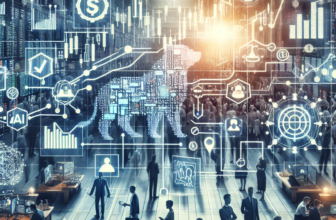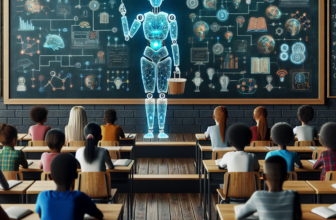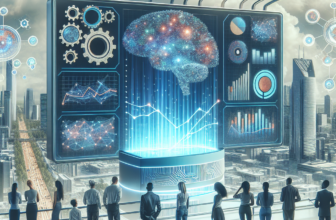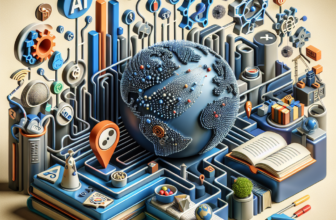The Future of Artificial Intelligence: How AI is Revolutionizing Industries

The Future of Artificial Intelligence: How AI is Revolutionizing Industries
Artificial intelligence (AI) and machine learning have become increasingly prevalent in our day-to-day lives, and their impact is being felt across a wide range of industries. From healthcare and finance to transportation and entertainment, AI is revolutionizing the way we work, live, and interact with the world around us. In this article, we’ll explore the future of artificial intelligence and how it is transforming industries, as well as answer some frequently asked questions about AI and machine learning.
The Role of AI in Industry
AI and machine learning technologies are being integrated into various industries, providing businesses with new tools and capabilities that were previously unimaginable. In healthcare, AI is being used to analyze medical images, diagnose diseases, and personalize patient treatment plans. In finance, AI is revolutionizing fraud detection, risk management, and investment strategies. In transportation, AI is driving the development of self-driving cars and optimizing logistics and supply chain management.
Furthermore, AI is also transforming the way we interact with technology and the internet. Virtual assistants, chatbots, and recommendation systems are all powered by AI and are becoming increasingly sophisticated and personalized. As a result, businesses are able to provide better customer service, improve user experiences, and make more data-driven decisions.
The Promise of AI in Industry
The potential applications of AI and machine learning in industry are virtually limitless. AI has the ability to automate repetitive tasks, analyze vast amounts of data, and make predictions and decisions in real-time. This has the potential to increase efficiency, reduce costs, and drive innovation across a wide range of industries.
Furthermore, AI has the ability to unlock new opportunities and create entirely new business models. For example, in the healthcare industry, AI has the potential to enable personalized medicine and improve patient outcomes. In the finance industry, AI can help identify new investment opportunities and reduce the risk of fraud. In the transportation industry, AI has the potential to make transportation safer, more efficient, and more sustainable.
Challenges and Considerations
While the promise of AI is vast, there are also challenges and considerations that need to be addressed. One of the main concerns is the impact of AI on the workforce. As AI becomes increasingly capable, there is a fear that it may replace human workers, leading to job displacement and economic inequality.
Furthermore, there are ethical and privacy concerns surrounding the use of AI. For example, AI-powered surveillance systems raise questions about privacy and civil liberties. Additionally, AI algorithms have been shown to exhibit bias and discrimination, raising concerns about fairness and accountability.
Frequently Asked Questions
What is the difference between AI and machine learning?
AI is a broad field of computer science that focuses on creating machines that can perform tasks that require human intelligence. Machine learning is a subset of AI that focuses on algorithms and statistical models that enable computers to improve their performance on a specific task over time.
How is AI being used in industry?
AI is being used in industry to automate repetitive tasks, analyze data, make predictions, and optimize processes. In healthcare, AI is being used to diagnose diseases and personalize treatment plans. In finance, AI is being used for fraud detection and risk management. In transportation, AI is being used to develop self-driving cars and optimize logistics.
What are the ethical considerations surrounding the use of AI?
There are ethical considerations surrounding the use of AI, such as concerns about job displacement, privacy, and bias. It is important that businesses and governments address these concerns and ensure that AI is used in a responsible and ethical manner.
What are the potential benefits of AI in industry?
The potential benefits of AI in industry are vast, including increased efficiency, reduced costs, and new business opportunities. AI has the potential to transform the way businesses operate and provide value to customers.
How can businesses integrate AI into their operations?
Businesses can integrate AI into their operations by investing in AI technologies, developing AI strategies, and training their workforce. It is important for businesses to have a clear understanding of how AI can benefit their operations and to develop a plan for integrating AI into their business processes.
Conclusion
The future of artificial intelligence is happening now and its impact is being felt across a wide range of industries. AI and machine learning technologies are revolutionizing the way we work, live, and interact with the world around us, providing businesses with new tools and capabilities that were previously unimaginable. However, it is important that businesses and governments address the challenges and considerations surrounding the use of AI and ensure that AI is used in a responsible and ethical manner.
Overall, the potential applications of AI in industry are virtually limitless and it has the ability to increase efficiency, reduce costs, and drive innovation. It is clear that AI is here to stay and will continue to play a vital role in shaping the future of industries across the globe.







